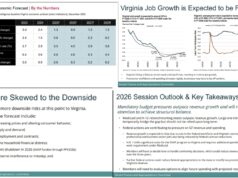
It’s not often that I feel a need to thank the Richmond Times-Dispatch for providing information helpful to progressive politics, but here goes: Thanks, Times-Dispatch, for sending Virginia’s members of Congress a questionnaire about their views on global climate change. The answers the newspaper got and published allow me (Hey, I am a retired teacher!) to grade our state’s congressional delegation’s views on global warming and how to mitigate it.
Let’s get the F’s out of the way first.
D-/F: The entire Republican delegation. At least you can say this about Virginia Republicans: they don’t appear to be outright climate change deniers. Other than that, though, they have basically nothing to offer on this issue, voting against the American Clean Energy and Security Act (ACES) and everything else that might actually allow the United States to address the problem. They also have no credible program themselves.
The only Democrat who merits a D, albeit a D+, is Glenn Nye (D-2nd). Nye does acknowledge that global warming “is a real and serious problem, and we must work to correct our current energy practice.” Then, Nye turns around and opposes any serious measures to solve the problem, first and foremost setting some sort of price on carbon. Nye voted against ACES, which really is inexcusable, given that his coastal district is so vulnerable to the effects of climate change.
There were four congressional members who merit an A+: Bobby Scott (D-3rd), Tom Perriello (D-5th), Jim Moran (D-8th) and Gerry Connolly (D-11th).
All four of these Democratic representatives agree that human activity is dramatically and dangerously heating up our planet. In addition, all four put their votes where their rhetoric is, by supporting ACES, which passed the House of Representatives by a vote of 219-212 on June 26, 2009. Thank you to all four Congressmen for showing leadership in a way that really matters – protecting our planet for us and for future generations.
B+/B: Sen. Mark Warner (D) doesn’t get in the “A” range because he gets marked down for arguing that “coal’s got to be a huge part of the mix.” Actually, if we’re going to solve the climate crisis, coal probably can’t be a “huge part of the mix,” unless by some miracle someone figures out a way to safely sequester carbon dioxide and to end mercury releases by coal-fired plants. Still, Warner’s answers were otherwise excellent, talking about the “overwhelming science” of climate change, the “real threat” from both climate change and our addiction to oil “from countries that are anti-American,” the tremendous opportunity afforded by the clean energy sector, plus being open to “a price on carbon” and to “cap and trade.”
C+/C: Rick Boucher (D-9th) gets marked down big time for saying, “Congress must act by adopting its own regulatory program that ensures a strong future for coal, allows utilities to continue burning coal and preempts EPA regulation in any manner inconsistent with the Congressional direction.” However, Boucher passes for two reasons. First, he voted for ACES, despite the fact that his district is largely in “coal country.” Second, he states his support for “the same kind of market-based trading mechanism which was successfully used in controlling sulfur dioxide emissions from coal-fired power plants in 1990.” Boucher did manage to get changes in ACES that mitigate the costs to the coal industry, so any attempt to use his vote to paint Boucher as “anti-coal” is ridiculous, and people in his district know that.
Sen. Jim Webb also merits a C+. While Webb is excellent on many issues and I’m thrilled he’s in the Senate, on energy and the environment…well, let’s just say we don’t see eye to eye. Webb has introduced a bipartisan bill, (S. 2776) with Lamar Alexander that is heavy on investment in nuclear energy – much more than renewables. Webb did say that “responsible energy policies have the potential to reduce carbon emissions, provide energy security and create alternative energy jobs for our local communities.” He also strongly agrees that “the temperature increase since the late 1970s has been mostly due to the increase in greenhouse concentration resulting from such activities as fossil fuel burning and deforestation.”
As for Bob McDonnell. He gets an F for shoveling his trademark brand of meaningless verbal gobbledegook all over his answers, stuff like this:
Climate change is a concern, and there is rightly vigorous debate over how to best address it…Conservation is a conservative value, and I support policies to clean up our environment, preserve our natural wonders, and promote alternative energy sources…Finally, I am committed to making Virginia the global leader when it comes to university-based research and development of alternative energy solutions…The answer is in advancing and encouraging new energy solutions, not taxing Virginia businesses and workers.













